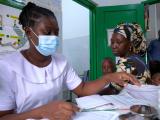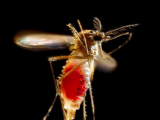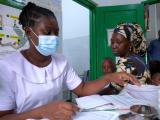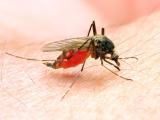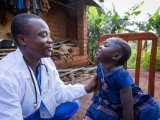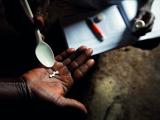Hundreds of malaria patients enrolled in a phase 3 clinical trial in Gabon, West Africa, were successfully treated with a one-time therapy that combines four commonly used malaria drugs, according to a new study presented yesterday at the American Society of Tropical Medicine and Hygiene.
For this pragmatic, randomized, comparative study, a team led by researchers at the Medical Research Center of Lambarene and the Institute of Tropical Medicine in Germany's University of Tubingen treated more than 1,000 people diagnosed as having uncomplicated malaria, or those who were sick but not yet having life-threatening symptoms.
Slightly more than half the participants (539) received a single-dose regimen composed of four different malaria drugs. The remaining participants (442) received a widely used malaria treatment that combines two drugs and requires six doses over three days.
At day 28, blood tests showed that 93% of people who received the single-dose treatment were free of parasites, compared with 90% of those who received the three-day treatment. No serious adverse effects were noted in any patients.
"We found that our single-dose treatment was just as effective as the standard course that typically requires taking six doses spaced out over three days, which many patients never complete," said lead author Ghyslain Mombo-Ngoma, MD, PhD, in the news release.
Urgent need for new ways to treat malaria patients
The need to find new ways to treat malaria is pressing, the authors said. After falling from 2000 to 2015, malaria infections and deaths have increased significantly.

